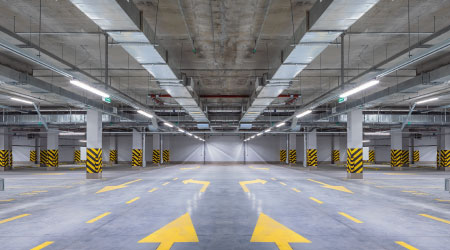
Case Study: Video Allows for Flexibility for Parking Management
March 21, 2022
Just like other industries around the globe, the patience of parking operations management has been tested as the usage of parking facilities in urban and suburban settings fluctuated widely over the past two years due to local health and safety and occupancy restrictions. As the overall industry looks to spring back from COVID-19 levels, it is also simultaneously looking to transition from traditional analog and on-premise managed operations to solutions that digitize parking operations and provide a more contactless experience.
Investments in digital tools such as platforms that employ computer vision technologies are one solution helping to speed up this digitalization through better management of parking lot occupancy levels, eliminating paper ticketing systems, parking barriers and other traditional physical elements of commercial parking. One area in particular gaining steam is the deployment of smart cameras, which can perform functions from license plate recognition to traffic flow detection and speed as well as a host of other utilities. These capabilities are particularly useful in surface lots and parking structures in environments such as airports and sporting venues, to large retail or corporate parking areas.
Munich-based Peter Park has helped many parking operations begin to migrate to more sophisticated technologies by connecting different digital services such as payment apps, e-charging systems and navigation providers to further increase the security and automation. Peter Park’s cloud-based offering is based on the use of license plate recognition technology (ANPR), which often requires specialized license plate recognition cameras to identify a specific vehicle, detect the duration of stay and integrate with online payment systems for a fully digital parking experience.
Smart cameras offer flexibility in camera selection and functionality
Instead of LPR cameras, the company is using new smart cameras with powerful microprocessors to fuel intelligent onboard analysis via multiple video analytics applications on the camera. Based on an open IoT platform from Security & Safety Things, these cameras can be equipped and flexibly re-equipped with a variety of applications, including license plate recognition, analytics to detect the presence of smoke, fire, ice, spills or other hazards within the parking environment and other ready to install applications that fit the most pressing needs of parking management.
“We can not only use the best application for the computer vision task, but we can also pick and combine the best camera types of different suppliers for each setup, taking full use of the broad spectrum of different camera features such as zoom control, as an example,” says Maximilian Schlereth, CEO and co-founder of Peter Park.
Smart vehicle routing and reduced hardware maintenance costs
The reduction or elimination of parking gates and ticketing machines can have positive impacts on staffing levels within parking management and drastically reduce hardware purchase and maintenance costs of the parking gates and ticketing devices. Additionally, cameras outfitted with parking management apps can help to direct traffic flow by analyzing the queue of vehicles waiting to enter the facility and pairing them to available spaces or recognizing when a particular parking area is full. They can also assist in controlling the flow of traffic at peak times to prevent jams and long waits at exits or identify the vehicles of VIPs or season ticket holders at an event venue and route them accordingly to the appropriate parking lot.
Parking lot monitoring and incident detection
Smart cameras can also help to manage people, providing valuable security and visitor management functions. Crowd detection analytics can detect the formation of a crowd in the stadium parking lot before it escalates into a post-game brawl, and people counting analytics can detect the number of occupants within each vehicle entering a parking area to better determine anticipated attendance of an event or daily occupancy level of a corporate office location. Analytics can also detect individuals holding weapons and selectively transmit related imagery to help remote operators or on-site security personnel assess and address the situation.
Next
Read next on FacilitiesNet












